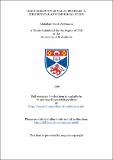Files in this item
Saudi executives' value profiles: a theoretical and empirical study
Item metadata
| dc.contributor.advisor | Malek, M. (Mo) | |
| dc.contributor.author | Al-Naeem, Abdullatif Saleh | |
| dc.coverage.spatial | 353 p. | en_US |
| dc.date.accessioned | 2018-07-12T09:18:17Z | |
| dc.date.available | 2018-07-12T09:18:17Z | |
| dc.date.issued | 1999 | |
| dc.identifier.uri | https://hdl.handle.net/10023/15288 | |
| dc.description.abstract | This study aims to add to the knowledge of previous research which has focused on individual values in developing countries in general and in the Kingdom of Saudi Arabia in particular (KSA). Only little serious research on values has been conducted in the Saudi business and management environment. The main objectives of this thesis are: to identify empirically the value profiles of Saudi executives in both their personal and managerial lives; to investigate the differences between the value profiles of specific groups of Saudi executives such as those at the top level and those of the middle levels and also those of listed (joint stock) and unlisted (private) business companies; to investigate the relationship between the personal and managerial value profiles of Saudi executives and their personal and organisational characteristics; and to identify the extent to which it is possible to classify the value profiles of Saudi executives in the private sector. In order to reach these objectives, a theoretical framework was developed through which Saudi executives' values could be identified and measured. The study was based upon Eduard Spranger's classification of values (Theoretical, Economic, Aesthetic, Social, Political and Religious), and Allport instrument "The Study of Values". The instrument was modified in terms of religious and cultural perspectives to be applicable to the Saudi environment and a new section was developed for measuring the relative strength of the six values in the executives' managerial lives. Overall, the results of this research show that the different groups of Saudi executives display a similar rank order of the six personal values across their personal and organisational backgrounds and a similar ranking of managerial values. Nevertheless, significant differences were found in both profiles of values within each individual group. Surprisingly, analysis of the results showed that managers at the top levels place less emphasis on Economic values than those at middles levels. The analysis also showed that those who work for listed companies placed more emphasis on Economic values than those in private firms. The results also suggest that Saudi executives with different personal and organisational characteristics do not share similar personal and managerial value profiles. Moreover, although average Saudi executives scored highest on the Economic values and lowest on the Aesthetic values in both profiles, they displayed different responses to the remaining four values in both value profiles. The results suggest that although average Saudi executives showed dissimilar personal and managerial value profiles, these profiles did relate, and that the general value system of Saudi executives could be deconstructed into three value profiles: the personal, managerial, and the personal-managerial interrelated profiles. With respect to the classification of value profiles, the results revealed that only four managerial value profiles with different ranking orders of the six classes of values are considered distinct to Saudi executives; Theoretical, Economic, Social, and Religious. Managers can thus be expected to show various types of behaviours when making their decisions as well as varying levels of managerial performance and organisational efficiency. Saudi business organisation, therefore, should choose those candidates with relevant value profiles from the four that have been identified in this study that best fit the goals and strategies of the organisation and place them in an appropriate environment in order to maximise the benefit from those individual's skills and experience. The various findings of this research, the theoretical and practical implications, and suggestions for future research in this field are presented in the last chapter of this thesis. | en_US |
| dc.language.iso | en | en_US |
| dc.publisher | University of St Andrews | |
| dc.subject.lcc | HD60.5S2A6 | |
| dc.subject.lcsh | Social accounting | en |
| dc.title | Saudi executives' value profiles: a theoretical and empirical study | en_US |
| dc.type | Thesis | en_US |
| dc.type.qualificationlevel | Doctoral | en_US |
| dc.type.qualificationname | PhD Doctor of Philosophy | en_US |
| dc.publisher.institution | The University of St Andrews | en_US |
This item appears in the following Collection(s)
Items in the St Andrews Research Repository are protected by copyright, with all rights reserved, unless otherwise indicated.

